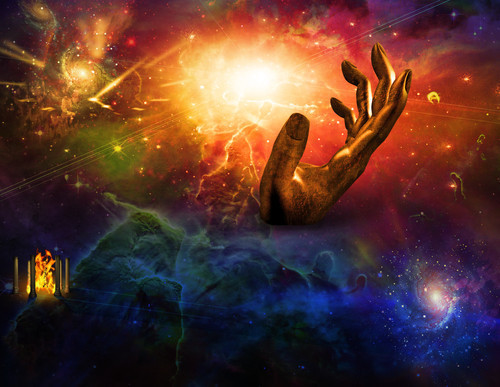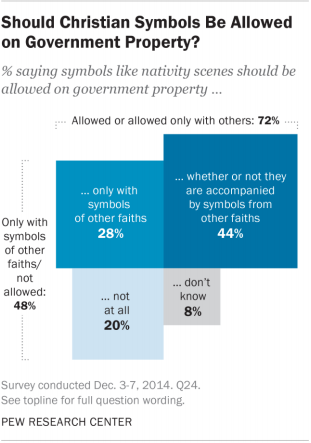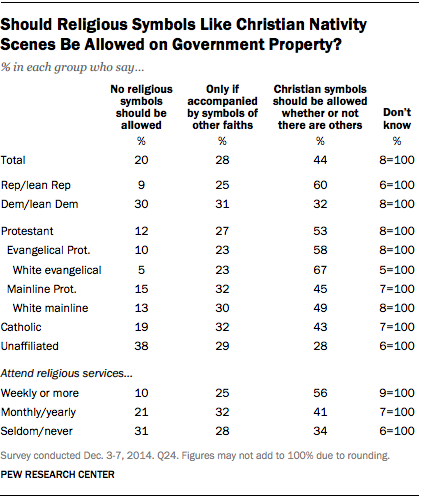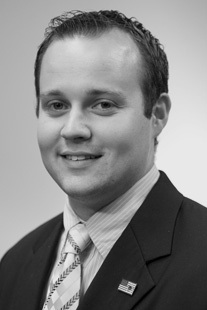Hemant Mehta's Blog, page 1837
December 27, 2014
Mauritanian Man to Be Put to Death for Allegedly Insulting Islam’s Prophet
As we’ve seen before, Mauritania is one of the worst countries in the world for freethinkers. Here’s another shameful notch in the nation’s belt:
A court in Mauritania on Thursday sentenced a man to death for “insulting” the founder of Islam.
The man, Mohamed Cheikh Ould Mkhaitir, 28, was arrested a year ago for writing an article that was interpreted by some as being critical of the Prophet Muhammad and saying that Mauritania allows a discriminatory caste system, an extremely delicate subject in a country with deep social and racial divisions.
The author, who has also been identified by some news agencies as Mohamed Cheikh Ould Mohamed, has said that his article has been misinterpreted. The prosecution asked for the death penalty to be carried out in accordance with Shariah and recommended that he be shot.
Not coincidentally (given the Qur’an’s thumbs-up to slavery, including the rape of slave women), also in Mauritania,
A court in the southern town of Rosso began proceedings on Wednesday against an antislavery campaigner, Biram Ould Dah Ould Abeiday, and six members of his organization for “inciting violence, disrupting public order, contempt for the authorities and membership of a nonrecognized organization.”
Mauritania was the last country worldwide to legally abolish slavery, in 1981, and still has the highest proportion of its population in slavery, according to a global survey compiled by an antislavery organization.
(Image via Shutterstock)
Indian Tribe Erects “Jesus Christ is Lord on the Crow Nation” Sign
In a move that would be right at home in the GOP, the Crow Nation tribe last year passed a resolution “proclaiming Jesus Christ as Lord”:
The Crow Constitution protects “full exercise of religion,” but, unlike the U.S. Constitution, does not contain a clause that prevents the government from the establishment of religion.
“As a sovereign nation, we’re not bound by separation of church and state,” said [legislator Conrad J.] Stewart, who penned the resolution. “People are afraid to say, ‘Jesus,’ in the political arena…”
And now, they’ve gone a step further by putting up a 33-foot sign saying “Jesus Christ is Lord on the Crow Nation.”
Because Jesus won’t know it unless He can see the sign from miles away.
Stewart said that, while the tribe’s public profession of faith could be seen as controversial, it isn’t intended to make non-Christians, including those who observe traditional Native American spiritual practices, uncomfortable.
“Some people may not believe in the name of Jesus,” he said. “That’s fine, we don’t put that down.”
“We’re taught by elders to respect all religions,” Stewart said.
And they’re apparently also taught to make sure one religion is declared supreme to all others.
It also seems weird that a tribe that prides itself on its independence would give homage to a religion that the proclamation even says outright was brought to them by “Christian missionaries… during the 19th Century.” If anything, you’d think they’d want to stick to their traditional forms of spirituality and not embrace a culture that’s already taken so much from them.
(image via Wikipedia. Thanks to Ross for the link)
Neil deGrasse Tyson Gets Accused of “Riling Up Christians” with Christmas Day Tweet About Isaac Newton
On Christmas Day, Neil deGrasse Tyson tweeted this gem:
It quickly became his most retweeted message ever, and many accused him of “riling up Christians.”
That’s completely absurd. First, Tyson goes out of his way not to be offensive. He doesn’t even like to be called an atheist in part because he worries that any label like that would alienate many of the people he’s trying to reach. Second, the only way that statement is anti-Christian is if you wrongly assume everyone should be celebrating the birth of Christ. As I’ve said many times before, Christians don’t own Christmas and Jesus wasn’t the only person (supposedly) born on December 25.
Celebrating Newton’s birthday makes sense. Using a setup that suggests you’re talking about Jesus is clever. Getting an online lashing for that tweet is ridiculous.
Tyson wrote this tweet last night in response to the whole kerfuffle:
He also explained on Facebook that he has no idea how his Christmas tweet generated such a response:
My sense in this case is that the high rate of re-tweeting, is not to share my enthusiasm of this fact, but is driven by accusations that the tweet is somehow anti-Christian. If a person actually wanted to express anti-Christian sentiment, my guess is that alerting people of Isaac Newton’s birthday would appear nowhere on the list.
Some even called for me to delete the tweet…
He plans to do no such thing.
Happy Holidays to you all. And a humble thanks for your continued interest in what I have to say about life, the universe, and everything. But most importantly, enjoy a Happy New Year. A few days after, I’ll be tweeting about Earth’s perihelion. Just a head’s up in case people want to avert their eyes over that one.
As anyone who’s been active on Twitter knows, there are plenty of thin-skinned people on there, looking for any excuse to take offense tweets that are otherwise innocuous (or funny in a way you don’t appreciate). Hopefully, they won’t deter Tyson from his educational and sometimes-pointed witticisms.
NBC Wonders Why Physicians Don’t Rely More on the “Power of Prayer”
Earlier this week, NBC News considered the pressing problem of physicians relying on medical knowledge alone rather than also incorporating pleas for supernatural intercession into their treatment plans.
You see, doctors don’t get everything right all the time; therefore, we need God in the mix.
This was essentially the gist of the piece. Cynthia McFadden interviewed Father John Murray, a Catholic priest who broke his neck in a fall. Despite predictions from doctors that he wouldn’t walk again, Murray is able to do so, and regards the recovery as nothing short of miraculous.
“‘You should expect no voluntary movement,’” said Murray. “That’s a quote. ‘No voluntary movement for the rest of your life.’”
But within a year and a half after he tripped on a Jersey Shore boardwalk, the priest was able to rise from his wheelchair and walk.
“I think it’s a result of prayer,” said Murray. “Other people’s prayers and my prayers, without a doubt.”
Such an anecdote really illustrates only two things, though. Firstly, medical predictions are not 100% accurate (since nobody claims they are, this is a pretty minor point). And, secondly, Father Murray believes prayer cured him. It is, of course, his prerogative to believe whatever he likes about his recovery; but without evidence to back it up, his belief about the cause of his recovery is just that: a belief.
That’s the objection that Dr. Harold Koenig, head of the Center for Spirituality, Theology and Health at Duke University, tries to anticipate. Dr. Koenig is an advocate for physicians and the medical care team participating in and facilitating a patient’s religious practice.
“People who are more religious just live longer; that’s kind of the bottom line,” said Dr. Harold Koenig.
Koenig said more than 4,000 studies have examined the connection between spirituality and health, with the number of studies tripling, by his estimate, in the past decade.
According to Koenig, most studies show religious people have better mental health, are less likely to experience depression, and cope better when they do. His own research shows that people who pray daily are 40 percent less likely to have high blood pressure.
“They have greater well-being, in general,” he said. “Religious people who are part of a faith community and have a relationship with God, so to speak, just have higher levels of well-being. They’re happier. And that’s been shown — hundreds of studies have now shown that.”
It’s important to note that, while the piece implies it, Dr. Koenig isn’t actually stating that prayer leads to supernatural intercession (the evidence can indeed point in the opposite direction and show prayer doesn’t yield any health bonus). He’s saying that people with a faith community and a spiritual side are happier, have lower blood pressure, etc. than those lacking spirituality and strong community.
Okay, fair enough.
But are Koenig’s supposed benefits a product of prayer or a byproduct of having a strong support network and a sense of belonging? Isn’t there also the possibility of a placebo effect at play — that a patient’s mental health and overall happiness can improve because he believes he is being guided to recovery? While these are certainly questions that should be asked before deciding that it simply must be God after all, NBC doesn’t spend much time considering reasons beyond the supernatural. (Well, not until the next night, anyway, when NBC gave skeptics a chance to negate the previous report’s theories.)
The fact is, you can demonstrate the effect that the presence of friendship and a supportive community has on people’s mental health; you can demonstrate the effect that mental well-being has on physical well-being; you can demonstrate the placebo effect. Those, then, are topics that belong in a discussion of medicine.
But supernatural intervention has never been demonstrated. It is merely claimed, though there exist far better explanations for the same scenarios. Until and unless the efficacy of prayer is demonstrated, it has no more place in medical treatments than ritual sacrifice or magic spells. The patient, his friends, churchgoers, etc., are and should be free to summon the protection of whatever spirits, deities, or forces they desire. But the medical team is there to provide scientifically valid medical treatment, not to appeal to supposed spiritual remedies or divine the capricious whims of gods.
(Image via Shutterstock)
Christian Author Makes Fine-Tuning Argument for God’s Existence in The Wall Street Journal
In a Christmas Day opinion piece (behind a paywall) for The Wall Street Journal, Christian author Eric Metaxas explained that science proved God because of an argument that’s been debunked so many times over, you have to really work hard to pretend rebuttals don’t exist:
Today there are more than 200 known parameters necessary for a planet to support life—every single one of which must be perfectly met, or the whole thing falls apart. Without a massive planet like Jupiter nearby, whose gravity will draw away asteroids, a thousand times as many would hit Earth’s surface. The odds against life in the universe are simply astonishing.
Yet here we are, not only existing, but talking about existing. What can account for it?…
The fine-tuning argument: A fallacy so absurd that Victor Stenger wrote a nearly 350-page book refuting it.
The simplest response is that, regardless of the supposed odds, if they were really so unachievable, we wouldn’t be here contemplating the “miracle” of existence. It’s very easy to look back on our universe’s good fortune, just as you can look back on your own life and think of all the things, good and bad, that had to be timed just perfectly for everything to work out as it did. An accident that happened in a split-second that left you injured. That time you missed a train and ended up talking to a stranger that you ultimately married. Countless numbers of ancestors meeting and mating. Our lives are nothing but a string of coincidences put together. Each one seems incredible on its own and it’d be impossible to predict it all in advance, but you have to travel down some path. It only looks “miraculous” in hindsight.
(Image via Shutterstock)
Survey: Americans Are Just About Evenly Split On the Issue of Religious Displays On Government Property
When it comes to government endorsement of religion, Americans are more or less evenly divided.
A new Pew Research Center survey finds that 44% of Americans say Christian symbols like nativity scenes should be allowed on government property even if they are not accompanied by symbols from other religions. In addition, 28% of U.S. adults say that such symbols should be permitted, but only if they are accompanied by symbols from other religions, such as Hanukkah candles. One in five (20%) say there should be no religious displays on government property, period.
Advocates on both sides of these disputes can take some heart in Americans’ views. On the one hand, nearly three-quarters of U.S. adults (72%) favor allowing Christian symbols on government property in at least some cases — either by themselves or with symbols from other faiths. Looked at another way, however, nearly half of Americans (48%) express reservations about these displays, either saying that Christian symbols must be accompanied by those from other faiths or that no religious displays should be allowed on government property.
The error in framing things this way is that very few atheists and agnostics believe that there’s a problem with equal access. That is, if state houses and municipalities allow for both a nativity scene and other displays of religion (or non-religion) to be placed, objections will be scant or non-existent.
The new survey also suggests that most Americans believe that the biblical Christmas story reflects historical events that actually occurred. About three-quarters of Americans believe that Jesus Christ was born to a virgin, that an angel of the Lord appeared to shepherds to announce the birth of Jesus, and that wise men, guided by a star, brought Jesus gold, frankincense and myrrh.
It always blows my mind to think that the vast majority of them would have believed an entirely different set of fairytales if they’d been born in, say, India or Indonesia.
There’s also this:
As Americans look forward to the holiday season, more than four in ten say they look forward “a lot” to attending religious services.
That may be, but don’t count on Americans to look forward to going to church the rest of the year. Less than 20 percent of them actually attend religious services on a regular basis (at least another 20% say they do but lie about it).
The Pew data were collected earlier this month from 1,507 adults. You can read more about the methodology here.
That’s One Way to Use the Bible Against Jesus
December 26, 2014
Josh Duggar: I Fight Non-Discrimination Laws Because LGBT People Deserve “Love and Respect”
The Duggar family will not shut up about how much they hate LGBT people, but they’re not brave enough to admit it.
While guest-hosting a program put on by the anti-LGBT Family Research Council, Pastor Richard Land spoke with Josh Duggar (below), one of TLC’s “19 Kids and Counting” darlings and now an FRC employee.
Duggar and his family recently spearheaded a movement to overturn a nondiscrimination bill in Fayetteville, Arkansas, which would have protected LGBT people from discrimination in employment, housing and public affairs. Since before the measure was even introduced, his family has served as the face of the anti-equality movement in Arkansas, perhaps best characterized by a robocall from matriarch Michelle Duggar comparing transgender people to sexual predators.
Here’s the clip of Land interviewing Duggar:
Duggar: …The other side is very vocal right now and they’re very clear on what their agenda is, the fact that they want to silence people who disagree with them. We have to stand up in love and say, ‘You know, we’re gonna stand up for what’s right, and we believe in this.’ I have so many people that I know who are gay or that lifestyle, but we have to go out there, we have to show them that kind of love and respect that they deserve as human beings. But we also have to stand up for our religious conscience rights and making certain that people are protected and that they have their voice as well, preserved. And I think that’s the balance we’re always striking, is to make sure — and I know, I was a small business owner for a number of years, and I was in the car business, I sold cars to people who didn’t have the same opinions and beliefs as I did, and that never became an issue. But when they’re trying to say you have to agree with someone, I think that’s the greatest challenge is saying this is not about, you have to agree with someone in order to do business with them. That is not the case, ever.
Land: If you read the radical gay groups, their goal is very clear. Their goal is to use the power of the state to force everyone to accept and affirm their lifestyle and to marginalize anyone who disagrees with it to the level of being the social outcast equivalent to a Klansman. And the only way they can get away with that is to do nothing. So I want to give an “attaboy” and “attagirl” to all the people in Fayetteville who stood up and defended their rights. And now, Joshua, as the executive director of Family Research Council Action, I assume you’re seeing this kind of grassroots pushback all across the country.
Duggar: We are. We know that the people’s voice ultimately is what matters. What we’re seeing right now is a lot of distortion out there. I’m reminded of a quote from Rick Warren, actually, of all people, and he says our culture has two huge lies. The first is that if you disagree with someone’s lifestyle, you must fear or hate them. The second is that to love someone means you must agree with everything they believe or do. Both are nonsense. You don’t have to compromise convictions to be compassionate. And I think grassroots people are realizing that, and they’re saying, ‘You know what, we still love everyone as Christ commands us to, we still have compassion, we still have those kinds of feelings, but we also have our convictions, and we have our beliefs,’ and at the core of that, that’s what makes America great, is that fact that we have dissenting opinions, and we’re going to go out there and go to the ballot box and stand up for what we believe.
Land: Well that’s right, and you know, if you really love somebody, you’re going to tell them the truth as you understand the truth. That’s why people in your family will tell you stuff that people outside won’t tell you. Because they love you. And they tell you the truth. And we need to speak the truth and love, and the Bible’s not neutral about lifestyles. The Bible approves and blesses some lifestyles and doesn’t approve and doesn’t bless others.
For a family man, Duggar seems to have a warped idea of what love looks like. Let’s rephrase what he’s saying more honestly:
“I want you to get fired for something you can’t control because I love you.”
“I think you deserve to be harassed every time you use a public restroom because I love you.”
“I believe you and your partner should get kicked out of your apartment because I love you.”
“I would be okay if you were banned from visiting your dying partner in the hospital because I love you.”
“I don’t mind if you and your children are legal strangers because I love you.”
It’s time to stop masquerading blatant hatred and disgust as “love” and “concern.” This kind of rhetoric trickles down into families and communities who have been led to believe that harassing, harming and abandoning their LGBT children are ways of displaying “love.” If you’re going to spread this kind of bigotry, at the very least own up to it.
(via Joe. My. God.)
Why Would Anyone Vandalize a Nativity Scene Like This?
Sacred Hearts Roman Catholic Church in Massachusetts, like many other churches, has a Nativity scene on its property. They don’t get any taxpayer money to do it. They’re not asking for government support of it. They’re just doing their own thing and we ought to respect their ability to do that. Unfortunately, someone thought it would be funny to mess with the central figure in the scene:
A baby Jesus statue at a Haverhill church’s nativity scene was taken and replaced with a “freshly decapitated” pig’s head on Christmas morning, police said.
They have a replacement Jesus already, but let’s not mince words: this is despicable. There’s no evidence that an atheist did this, to be clear. Still, let me join the chorus of people condemning this act unequivocally. The church leaders did nothing wrong and they shouldn’t have to worry about anyone vandalizing their property like this.
The police said this could be considered a hate crime.
I’ve reached out to Father Delaney to see if there’s anything our community can do for the church, but the simplest gesture on our part would be to say publicly that we oppose this sort of destruction.
(Thanks to Scott for the link)
Comedian Bill Burr on How He Shed His Faith
Comedian Bill Burr‘s latest special on Netflix is called “I’m Sorry You Feel That Way” and more than a few of you have mentioned this bit he does about religion. There’s nothing particularly new as far as comedy goes, but it’s always fun to hear someone on a large stage talking about his religious deconversion and what led him to that moment:
(Thanks to Kyle for the link)
Hemant Mehta's Blog
- Hemant Mehta's profile
- 38 followers















